Welcome
This website is the personal knowledge base of @jakintosh. It is a collection of thinking, writing, work, and reflection. The goal is to communicate both knowledge and process, and so every page is composed of both a garden and a stream.
The Garden is the manicured, pruned, and always evolving "living document" for a given topic or project. The garden captures the current state of my knowledge, and is the primary content at the top of each page.
The Stream contains a reverse chronological action log that shows what has happened to get the garden to its current state. The stream captures the historical process of knowledge on the site, and can be found at the bottom of every page.
Highlighted Pages
- /coalescence landing page for my philosophical work
- /degrowth a movement towards a new way of living
- /collapse an understanding of the social reality we occupy
- /repair a worldview centered on agency and understanding
- /coalescent computer my project for humane networked computing
Recently Updated Pages
- [2024-03-10] /simple-stool
- [2024-03-10] /cutting-board
- [2024-03-06] /gear
- [2024-03-06] /desk-riser
- [2024-03-01] /ipod-2006
- [2024-02-18] /woodworking
- [2024-01-07] /architecture
- [2024-01-03] /architecture-ching
- [2023-12-28] /bicycle-manifesto-tracy
- [2023-12-27] /urban-science-bettencourt
Now Reading
Introduction to Architecture
Francis D.K. Ching & James F. Eckler | Wiley (2012)
BICYCLE!
Sam Tracy | PM Press (2013)
Introduction to Urban Science
Luis M. A. Bettencourt | MIT Press (2021)
The Death and Life of Great American Cities
Jane Jacobs | Random House (1961)
Order Without Design
Alain Bertaud | MIT Press (2018)
Recent Stream Updates
March 1, 2024
/stream /woodworking /desk-riser
Today I gave a final high-grit sanding to the desk risers after letting the oil saturate overnight, and another light wipe down of hemp oil.
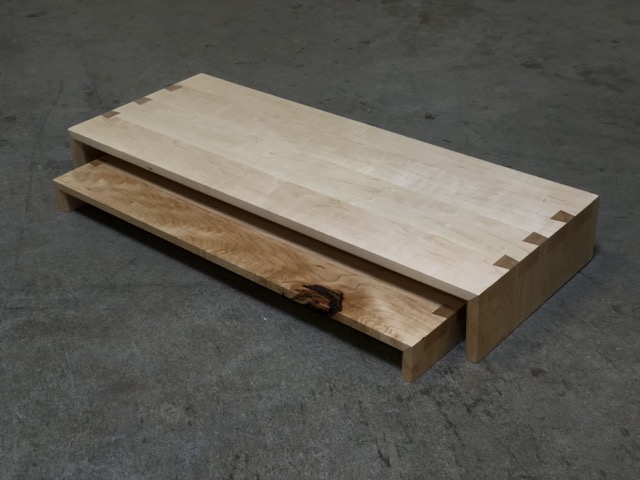
I'll continue buffing with a rag every day or so while they cure over the next week. Once they're no longer leaving oil on my finger tips, it will be time to take them home.
February 29, 2024
/stream /woodworking /desk-riser
Last night I glued up the dovetail joints on the desk riser, and today I planed (with a chisel) down the protruding pins and then sanded the whole thing to 220 grit, and then 400 grit on the outer surface.
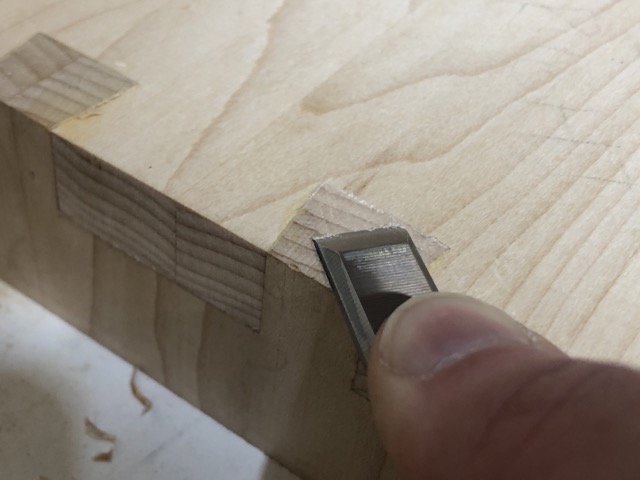
Once sanded, I finished with a generous coat of hemp oil. I didn't let it drink all it wanted, but I did pour the oil directly onto the surface to flood it a bit.
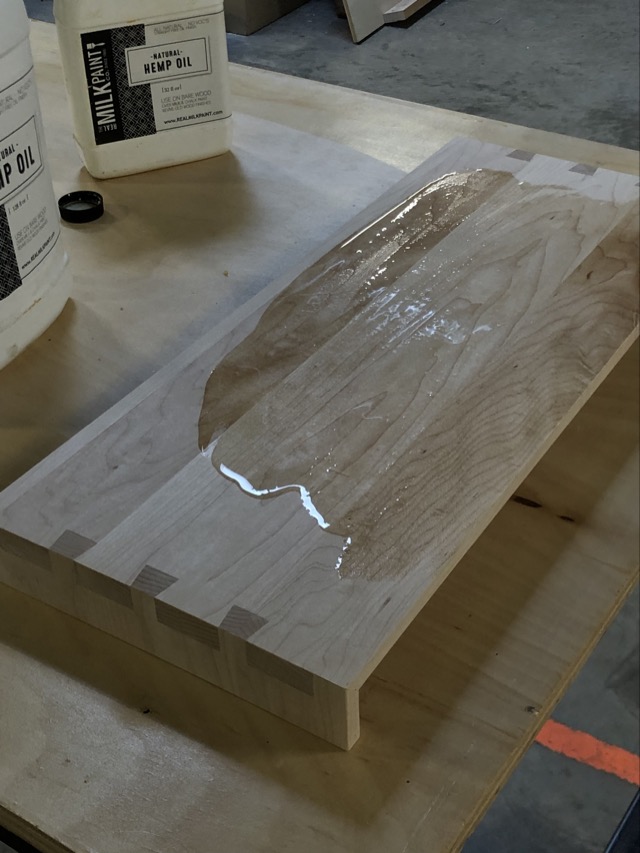
As a relatively "high use" surface, I wanted it to be better protected than a wipe-on application, but I don't think it needed to really drink all the oil it would take.
February 28, 2024
/stream /woodworking /simple-stool
Began working on a new /woodworking project: a three-legged stool made from the reclaimed lumber from my previous bed frame. The goal is to practice using reclaimed lumber, and to cut angled through-mortises by hand.
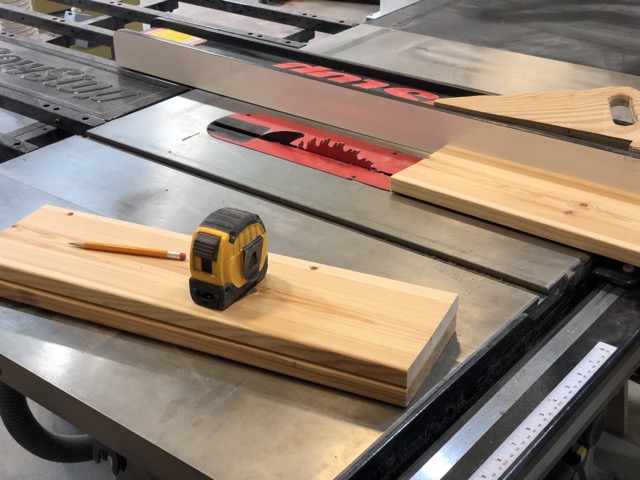
The three legs were made from a single 5-foot slat. First it was cross-cut into three 20-inch pieces, and then each piece was ripped in thirds again. Those three strips were glued together to create the thicker posts used to form the legs.
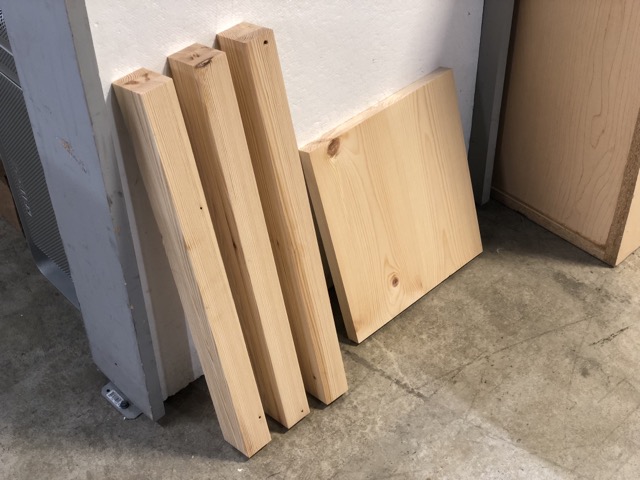
For the seat, I took a roughly 2-foot segment of a long beam and glued it up into a squarish panel.
February 25, 2024
/stream /woodworking /desk-riser
It's been almost a year since I last worked on this desk riser project, since the next step was to cut three long rows of mitered dovetails in relatively quick succession. I finally had the time and focus to sit down for almost an entire day and get through that work, and so now all of the joinery work is complete on this small project. This was completed with my magnetic dovetail guide that I made, and my japanese dovetail saw (a Razorsaw #372).
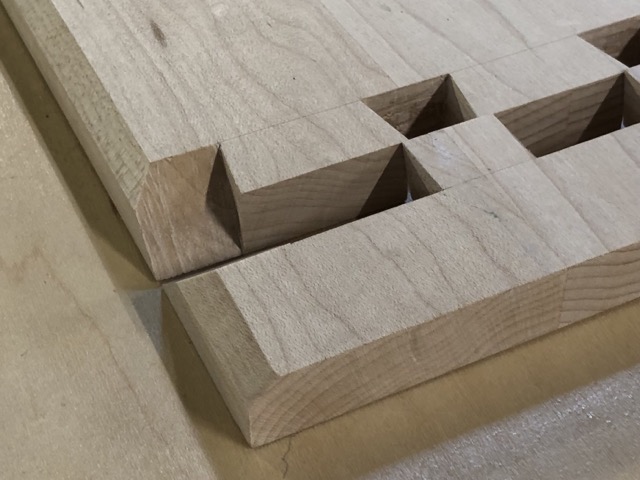
In addition to the dovetails and the mitered corners, I also cut a chamfer running along the entire "inner" surface of the board so that the visible edge looks thinner than it actually is. On this project I just used a router table, but in the future I hope to get a hand plane to do the job.
One wrinkle is that when doing the test fit, I realized that the smaller "leg" boards of the riser were so short that the end grain orientation made them weak; I split the end grain twice during the test fit process. Next time I'll keep in mind that I probably need a few more inches of board length to use dovetail joinery like this.
/stream /macbook-pro-2006 /ipod-2006 /permacomputing
After a decade of using streaming services, I've been increasingly feeling disconnected from music. I rarely listen to music anymore, and haven't really found new artists or even new albums in about 4 or 5 years. With MGMT's latest album releasing on Friday, I was planning to buy it on vinyl and really celebrate its release, but did not have the time to actually get a new record player set up before it arrived. I still went to the store to buy a physical copy, but it felt weird to just listen to it on Apple Music, so I dug out my old /iPod 5.5G (2006) to add some amount of tactility to the experience of a new album.
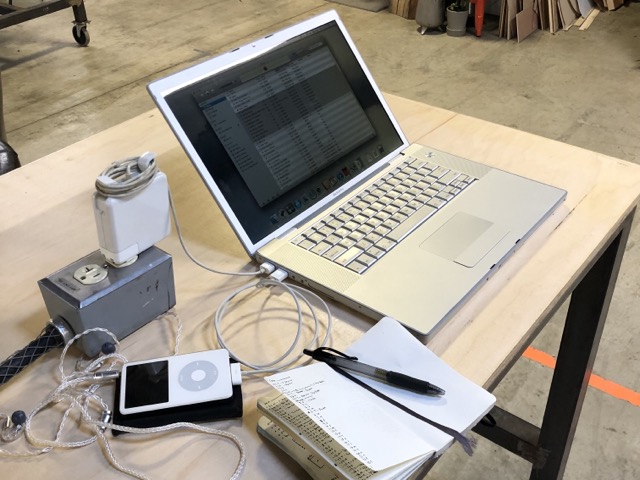
At first I was wondering how I would possibly load music onto this iPod... but then I remembered that all of my daily driver linux laptops are old MacBooks that were from the same era as the iPod, and that they all have old OSX installs on a second partition. It's been a lot of fun the past few days to start trying to revive some semblance of an iTunes library, while also shuffling through the extensive music library that already existed on this iPod; it was mostly the music my dad was listening to in 2006, with a few albums from bands I like. As a result, I've been listening to a lot of Sheryl Crow, Jimmy Buffett, and Tom Petty these last few days.
Overall, it's been really nice to dig this iPod out of a drawer and reclaim the ability to just listen to high quality music with a headphone jack and without wifi.
February 24, 2024
/stream /woodworking /tactical-urbanism
A friend and I spent some time on this very cold (but sunny) afternoon prototyping and chopping some dimensional lumber into benches.
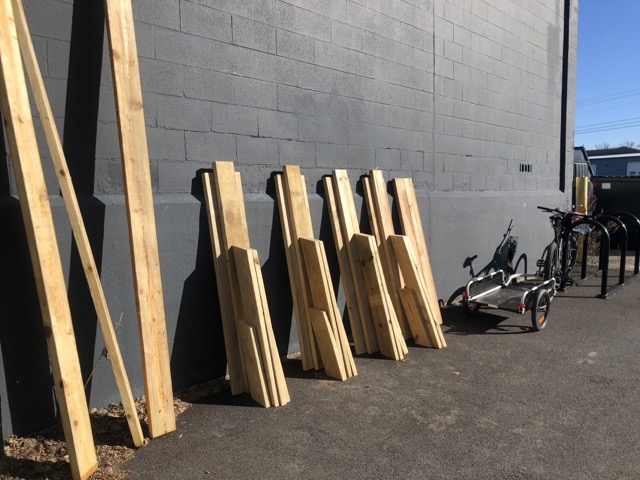
Benches are an easy and cheap way to make a place more welcoming. We've got some pretty decent and simple designs working using 2x6, 2x8, and 2x10 lumber, and only requiring a chop saw/circular saw and some screws. With enough motivation, you could do it with a decently sized hand saw as well. Once we get things working well, I'll share a guide to build them.
February 18, 2024
/stream /woodworking /cutting-board
For the past nearly two weeks of my wood shop time, I've been working on an end grain cutting board to replace an aging IKEA cutting board at home. End grain cutting boards are very popular in "pop-woodworking", playing the role of a common project for beginner woodworkers. Knowing this, I jumped into making one thinking it would be an afternoon project. I was wrong.
The main issue is that the strain of woodworking that end grain cutting boards are popular with is the type of suburban dad whose favorite part of being a "DIY guy" is buying power tools. Making an end grain cutting board requires a ton of boring (yet tedious) glue ups, and flattening end grain. In fact, this is the whole process: a mass repetition of cutting boring strips of wood, those tedius glue ups, and then figuring out how to get it flat.
No part of the process was challening or interesting, and the standard way that most people achieve each step is through a heavy application of power tools. It wasn't until I had my final glued cutting board that I realized that I had no idea how to flatten end grain. When I looked it up, I found out that the standard process was either to run it through a planer even though everyone knows it's very dangerous, or to set up this nightmare of a router jig to effectively "CNC" the board flat.
Neither of those options were appealing to me, so I spent a week trying to restore an old hand plane I had in my studio hoping that would help me out. It didn't. I gave up and took the router jig path. While this did end up giving me a flat surface, it also completely chewed it up, collapsing the end grain and tearing out a bunch of divots. I now had a flat surface, but had no idea how to make it smooth. After again pursuing several more human-powered options, I ended up taking a low grit heavy duty handheld belt sander and grinding away until it looked presentable.
In the end, at least I've got a halfway decent looking cutting board. There are still final finishing steps I'd like to take, but overall I look at what I ended up with as a project full of compromises. There's plety of places where I could have "done it right" but didn't, because I hated working on it so much that I just wanted it to be over so that I can get to a different project that was more fulfilling. (I'll post a picture once it's done and oiled.)
The most valuable part of this project was that it gave me so much time to think about what I would rather be doing that it helped crystalize the aspects of woodworking that I love and hate. I love planning and designing furniture, and cutting precise joinery by hand. I hate glue, power tools, and sanding. Tomorrow I'm going to scour ebay for some used japanese hand planes.
January 7, 2024
/stream /reading /colophon
Spent some time building out "Now Reading" functionality using /collect. Essentially, every "page" that describes a book now has a handful of other @value objects on it for metadata like title/author/publisher, and I wrote a few @scope objects that render a book summary using those values. I also tagged those pages with additional @group tags "books" and "in-progress", so I can make a @list with @query objects to @include all of the "in-progress" items and then @filter those for "books". Then I @reverse that list and pass it to the different renderers, and now I can see all of the books that are in progress just by adding some metadata to those books' garden pages.
/stream /now
The recent months have been very busy and unstructured, and have led to a minor case of burnout. A lot of time was spent on a large housing policy change in my city, though it didn't end up nearly as effective as I'd hoped. Many friends, who are fellow advocates and activists, are also running for city council. In the midst of all of this, I (and my partner) finally caught COVID in early December after avoiding it for almost 4 years.
Given all of this, I entered the new year feeling like I had just completed a hard reset. I'm settling into it without any real resolutions, but with a few general directions to move in. Part of what defined the last year for me was a constant urgency that wreaked havoc on my attention, pulling me in a hundred different directions. There's still real work to be done, but I need to do that work in a way that is more sustainable and enjoyable for me.
The first direction is to be moving towards doing fewer "categories" of things. I don't know exactly how this will manifest yet, but I'm a little burnt out on things like organizing roles and low-level computer /programming. I'm also missing other types of work, like /woodworking.
This leads me to my second direction, which is a bit more specific: I want to explore what it might mean to be an "architect". As I've struggled with the intersection of my interests, my nature, and the problems and needs of the world, it feels to me like architecture (in a broad sense) may be the field where I can make the biggest difference. I'm a holistic thinker with aesthetic, design, and engineering sensibilities, a trained game desginer and "coder", and I have a deep understanding of housing policy and urban development. I think that low-impact or /degrowth lifestyles can be enabled, encouraged, and enshrined in creative architecture, and humanity also needs a lot of reponsibly designed and sourced buildings as it continues to shrink its footprint through the energy and urbanization transitions.
The third direction is towards documentation. I built this website last year with the goal of sharing a lot of the things I've learned, both concrete and abstract, but have not made the space to actually get things out of my head and into documentation. Not doing this has been one of the biggest things eating away at me, and I'd like to be more intentional about carving out time for this.
So that's where I'm at. Do less, document more, and explore architecture as an intersection of my skills and interests and the needs of the planet and my neighbors.
December 6, 2023
/stream /programming /december-adventure
Today's work was thinking work. Part of my goal of putting the /coalescent computer on pause was to start framing coalescent data within existing computing systems instead of a blank slate, and so I wanted this project to reflect that. Today I was thinking about how I would manage the different "resources" (accounts, entries, reports) in a coalescent way, and I think I came up with a plan to achieve that.
Each "agent" (user/node pair) will have its own event log, and each log can only be edited by its owner. A log is just a text file where each line describes some (CRUD) event on a resource. The logs can freely be synced with other agents, and each agent can keep track of how long it thinks each log is so that they know when there are new events to process in a given log. If my state tells me that agent1.log is 40 lines long, but my local copy is now 42 lines long, that means two events have come in for that log since the last time I processed events.
Effectively, this means the CLI will have some commands that write to the local agent's event log, an event log resolver that generates and modifies resources based on all of the event logs as a single logical unit, and then report generating commands that work from the local resources. There can be a little bit of state on an agent that helps it track and cache what it's already computed, but it can also at any point just re-run through all of the event logs again to rebuild the current state. Playing back events means it will also be possible to catch instances where new events are trying to write to "closed" books.
This sounds complicated when writing it all down, but I think with a little more planning it should be possible for this to be implemented pretty quickly (minus syncing, which will just be done with rsync).
December 5, 2023
/stream /programming /hare /december-adventure
Another short December Adventure session today, but I implemented some functionality for creating and listing accounts within a project. For now, this is done by adding files to an 'accounts' directory inside the project, and having each account file be the stringified version of an account struct. I should probably put together some kind of de/serializing functions that make it easier to re-ingest the text file back into program data later on, and also clean up the way I'm creating "resources" since I'll need to do a lot more of that. Honestly, if I have more than a few minutes to work on this tomorrow I should take a step back and do a bit more planning now that I have all of this infrastructure working.
December 4, 2023
/stream /programming /hare /december-adventure
I only had about twenty minutes for my December Adventure today, but managed to implement the books list command using the config work from yesterday. I also refactored those config functions to work as a general key-value store, which made it very easy to then also implement books set project to set the active project. Overall, the work I did yesterday made it so that implementing these other commands was pretty straightforward. I need to come back to this a bit later and think through the error handling a bit better, because for now it just unwraps all the errors with !.
$ ./books list
spiral-house
home
$ ./books set project home
ok
December 3, 2023
/stream /programming /hare /december-adventure
Had a pretty packed day, but found a few moments to tinker. Spent most of today's time starting to learn about the fs, io, and os modules of the standard library. Wrote a few functions for reading and writing files, and now the CLI for books lets you set a directory where it looks for your projects by default. Trying to lean on the filesystem to do all of the work in this project, so this "setting" is just a file $XDG_CONFIG_HOME/books/root that contains the path.
$ ./books set root ~/books
ok
$ cat ~/.config/books/root
/home/jak/books
December 2, 2023
/stream /programming /hare /december-adventure
Today's work on the December Adventure was more fleshing out of the command tree as I was thinking about the different types of resources that need to be created and managed. Things like accounts, journal entries, and so on. Fleshing out the tree has been a good test of my cli module, and is also a good way to think through the use of the program as a set of resources being managed.
I also needed to figure out a way to have the user set an active project and let the program know where to find project directories, and this led me to learn about the XDG Base Directory Specification, which is what defines the ~/.local, ~/.config, and ~/.cache directories, and what types of files should go in each. I learned something new, and also figured out how I should handle the default storage of configuration and state data for this program.
December 1, 2023
/stream /programming /hare /december-adventure
I've been cutting my teeth on /hare for a few weeks now, and yesterday I finally got my "learning project" (a CLI argument parsing module) finished. So today, I started work on a CLI double-entry bookkeeping program which I think is going to be my December Adventure for 2023.
Today's work was fleshing out a command tree using my new argument parsing module, and then learning about how the Hare compiler uses multiple source files. I can now compile a binary that executes a few placeholder subcommands.
November 24, 2023
/stream /reading /order-without-design-bertaud
Through my work on /livable city advocacy in my home city, I've met a lot of people with different lenses on how to look at some of the core issues. One of those people has been one of the most analytical and data driven policy thinkers I've ever met, and while at first the approach came across as cold to me, over the course of a year it became harder and harder for me to deny how well informed his thoughts were and how clearly his approach reflected the reality I was seeing in urban policy every day. The book he would frequently bring up as a primary influence to him was "Order Without Design: How Markets Shape Cities".
As someone who is both highly critical of the economic structure of Capitalism, but simultaneously holding a worldview centered on holarchy and emergent complex systems, there is a deep tension around the notion of "markets". Markets are not strictly tied to Capitalism, but markets are integral to its broader philosohpy. At the same time, markets are the same shape as one of the key information channels in an emergent and distributed complex system. As I solidified my distrust in The Market(tm) and began to cautiously embrace lower-case "m" markets as a social communication channel, I began to finally read this book.
The first chapter begins by outlining the author's experience as an urban planner starting in the 60s, his first experiences that showed him the cracks in traditional planning logic, and his first meaningful encounter with an urban economist that gave him deeper insight as to what actually caused those cracks in planning logic. It immediately touched on concrete examples of issues around /zoning and land prices, which is something we are dealing with right now, and I think that I'll come out of this book with a much more grounded understanding of urban economies and planning policy.
November 17, 2023
/stream /repair /bicycle /fixie
The intention for the /fixie was always that it would be deeply refurbished and modifed over the winter. After a few months of riding it around and getting a feel for it, it was finally time to take the first step of a full disassembly, followed by a cleaning and a paint job.
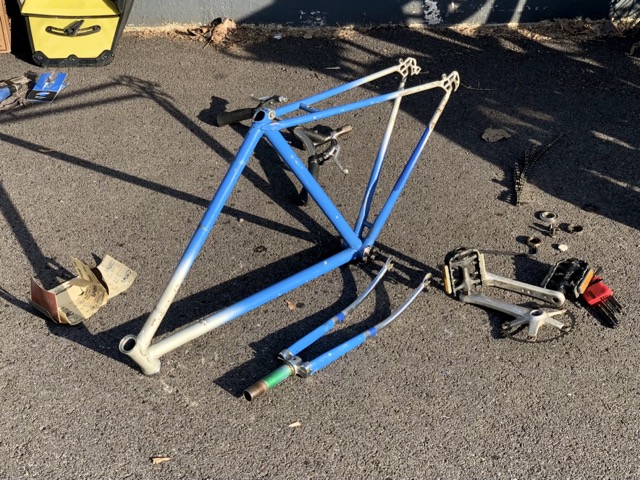
When I bought the bike, it already had a pretty poorly applied two-tone spray-paint job, so I had always intended to sand it down and repaint it properly. I removed everything except the headset and bottom bracket, masked those off, and painted the bike a "British Racing Green" using
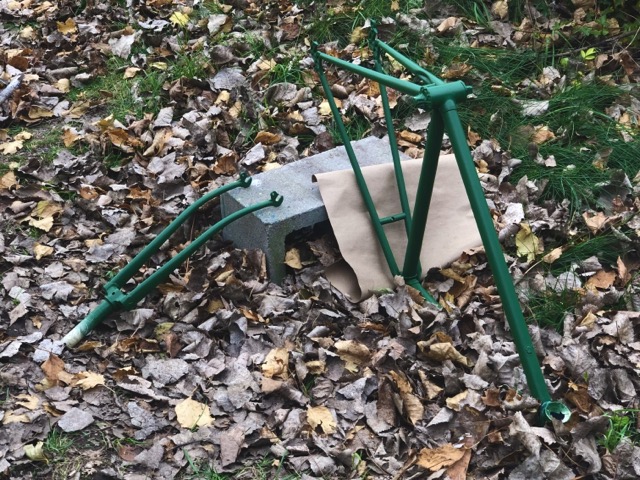
Since it's already mid-November here in Vermont, I was racing against the clock to get the bike painted before the temperature got too cold for the paint to be effective. I wish I had taken a bit more time to be more detailed in my sanding work and take the painting process slowly, but it was looking like I only had one last chance for the weather to cooperate the day I painted. Overall, it came out nicely, with only a few minor patches where previous paint/rust spots had not been fully smoothed out.
November 14, 2023
/stream /technology /programming /hare
Over the past few days, I've been starting to get acquainted with the Hare programming language. Someone on Merveilles mentioned something about it, and after looking it up something really clicked about it for me. I'd been really starting to sour a bit on Rust, especially the complexity of the ecosystem, and was thinking that I should start to learn 'C'. So finding the Hare language, which is an opinionated 'C' replacement whose opinions heavily match my own, has been a joy.
From what I can tell so far, the core idea behind Hare is that "Understandability of the Toolchain" should be the highest goal. You can bootstrap the compiler with gcc in about 30 seconds, with about 30k lines of source code. That's faster than building most simple Rust binaries with an empty cache. In terms of language features, it is focused on proven ideas implemented well, and consistency over syntactic sugar. As an example of its philosophy, its implementation of tagged unions turn a very basic type system into something that punches way above its weight class in terms of capabilities and program correctness. It makes a big leap from something like C towards something like Rust, but with an order of magnitude less complexity.
So far, the only things close to a "dealbreaker" is the limited editor integrations, like in-editor compiler warnings, and autocomplete/autoformatting. Perhaps I can try my hand at an LSP implementation...
November 11, 2023
/stream /technology /imac-2013
Acquired another new computer today, a 21.5" /iMac (2013). I'm writing this update from that computer, having moved over all of my tools and configuration. I'm not sure it's really a useful skill to be able to configure an old mac as a personal linux machine, but I'm getting pretty good at it. I appreciate the smaller footprint and lower power consumption than the 27" /iMac (2020) that it replaces. All of my transition towards linux as my daily driver operating system has occured on laptops so far, so this is the first time bringing my work to my desk on a (slightly) bigger screen.
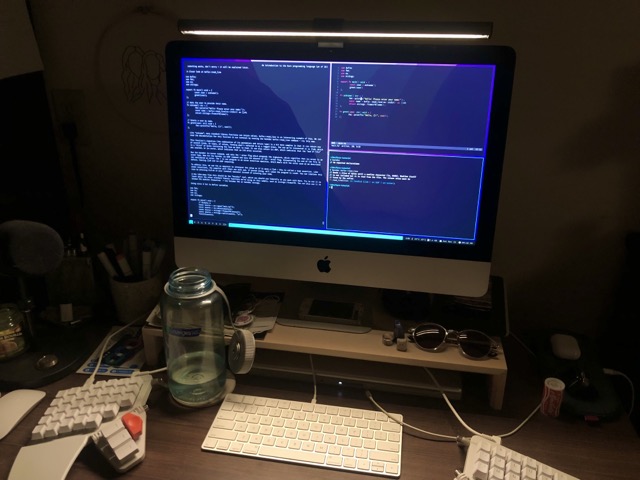
It's nice to finally have a linux desktop, though I'm bummed that my layout on my split keyboard does not translate at all from macOS to Linux. There are way too many hot-key changes, and so many programs implicitly rely on the QWERTY layout, that my custom configuration and ColemakDH layout were painful, and I've temporarily reverted back to a standard-issue Apple keyboard. I'll have to slowly redesign and (readjust to) the layout as I continue using my environment at a desktop setting.
November 8, 2023
/stream /technology /permacomputing /repair /macbook-2007
Disassembled the /MacBook (2007) today to give a proper internal dusting and a fresh application of thermal paste. Even after all the work done on the /MacBook Pro (2006), I still find myself using the /MacBook (2007) as my daily driver now, because it's smaller, lighter, and the plastic doesn't burn my legs as much as the metal case on the Pro. However, I've noticed that the CPU still seems to get quite hot, and I figured the 16 year old thermal paste wasn't helping much.
After the application, I noticed that peak thermals were much lower: ~68C as opposed to the ~80C I was seeing before when doing something like compiling a rust binary. The stable idle temperature during a work session hasn't changed much (~58C), but it takes much longer to reach that temperature (about 20 minutes of working), and temperature recovery back to baseline after a spike is also noticably better.
Hopefully this preventative maintenance extends the life of this computer even further than it was on track to go.
October 25, 2023
/stream /linux
A few days ago, I finally took a stab at a multi-machine "dotfiles" system. To get a feel for the challenges presented by a highly portable software environment, I've been jumping around between three different laptops, /MacBook (2007), /MacBook Pro (2006), and /MacBook Pro (2015). Keeping all of the distinct physical environments in sync as a single logical environment has been a huge, manual pain. The machines had slightly different configuration needs, so it took me a while to sit down and think about a solution. The approach I decided on was this: a "dotfiles" repo that holds the common configuration without any sensitive data (like user or server names in aliases), and then each machine assigns values to the secret environment variables, sources the common config root, and then adds any machine specific config in its local .zshrc.
One of the interesting parts that took some thinking was how to handle my shell script "micro apps", like my journaling utility. I used to just throw all the journal shell scripts in ~/bin and then define aliases to those scripts in .zshrc file, but with this new setup it ended up coupling machine configuration with "app" installation. Instead, I created a new repo just for the "journal app", which is composed of its original scripts and a new api.sh script, which exports a necessary environment variable and defines the aliases to its functional scripts. So now, on each computer that I want to "install" the journal on, I just clone the journal repo and then source the api.sh code from my local .zshrc.
All said and done, a local .zshrc file now looks roughly something like this on all of my different machines:
export SYNCUSER=## omitted ##
export SYNCSERVER=## omitted ##
export SYNCDIR=## omitted ##
source ~/tools/dotfiles/.zshrc
source ~/tools/journal/bin/api.sh
October 22, 2023
/stream /now
As per usual, the past six weeks have been incredibly busy. A large chunk of September was dedicated to organizing a downtown block party for World Car Free Day, which was a big success. I built some diy street barricades to help close the street, and we had a ton of neighbors turn out to celebrate.
Much of my time also continues to be dominated by the same /livable cities advocacy group, as we have become the primary group leading the grassroots conversation around policy changes needed to alleviate our city's housing crisis. With a comprehensive residential zoning overhaul in the works right now, there's not much time for other things.
I had some quiet time on a train recently, which I used to begin chipping away at a bare-minimum operating system for the coalescent computer, which I've nicknamed "lesceOS". It's been a good exercise to push the co assembler and toolchain a bit further, and get more practice writing my own language.
The art co-op is continuing to find its footing, and has not disappeared yet. We're starting to find some ways to bring in money to pay for rent, and I'm also learning about some of the types of situations that work better with delegated decision makers, vs needing consensus from 10 people.
/stream /tactical-urbanism /woodworking /diy-pallet-barricades
Wrote out the bulk of what I learned from building street barricades out of reclaimed pallets last month, in an effort to get it in writing before I forget. Still need to revisit later to add images, and perhaps some 3D illustrations/animations for maximum impact.
October 21, 2023
/stream /linux /games
With October in full swing, I've been in the mood to replay Space Funeral, a bizarre and spooky RPG Maker 2003 game by thecatamites with one of the best soundtracks in anything, ever. It's an old school windows EXE, and so I figured it would be a prime candidate to be run via Wine on Arch Linux. To make a long story short, I got it working. I imagine you can follow these instructions to get this game (and other similar RPG Maker games) working for yourself.
First, we need to make the lib32 packages available in pacman by enabling the multilib repo. We do this by uncommenting the [multilib] section near the bottom of /etc/pacman.conf.
...
[multilib]
Include = /etc/pacman.d/mirrorlist
...
Then we can install Wine and the other necessary components:
sudo pacman -S wine \
lib32-mesa \
lib32-gst-plugins-good \
lib32-pipewire-jack
WINEARCH=win32 winecfg
This installs Wine along with the 32bit dependencies for OpenGL and audio playback, and then configures Wine into win32 mode. I use X + DWM for my graphical environment, and Pipewire/Wireplumber for audio. From here, in my environment, the game ran without issue on the /MacBook Pro (2006).
If you don't want to keep all the junk you have to install once done playing the game (it's a bit much), you can remove it all like so:
sudo pacman -Rns wine \
lib32-mesa \
lib32-gst-plugins-good \
lib32-pipewire-jack
rm -rf ~/.wine
October 6, 2023
/stream /woodworking
Last Fall I discovered that our in-window air conditioning unit was about a half an inch taller than its product page claimed, because it didn't fit under the bed frame that I built specifically for that purpose. This year, in order to make sure we could fit the AC under the bed, I built some leg risers for the bed that match the design.
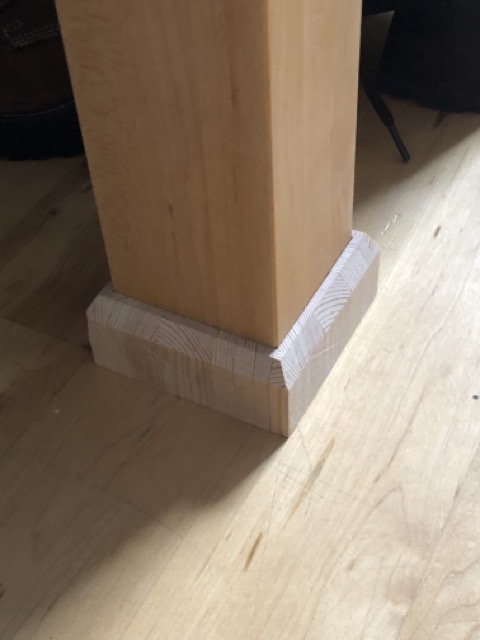
I used the same construction technique as the legs themselves: I cut a bunch of 1" x 1" strips, glued them up into 3" x 1" boards, and then glued those boards together to create a 3" x 3" post. Instead of 15" long posts like the original legs, these were cut into four 1" tall "pucks" that the legs would sit on.
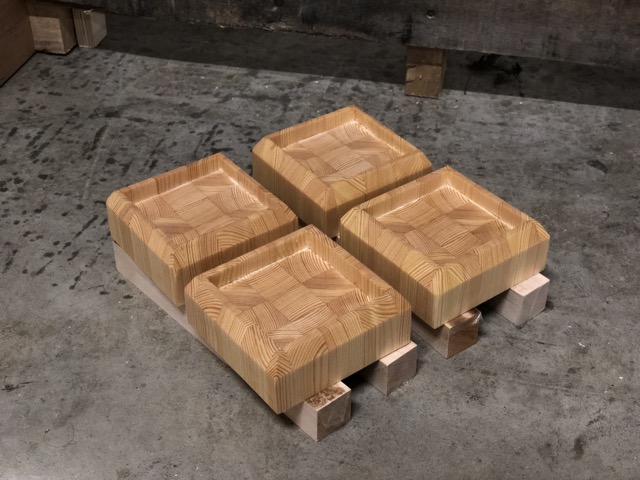
In order to keep the legs from sliding off the pucks, I also made some 4" x 1" boards and the resawed and planed those into something closer to 3.5" x 0.5". Those were then cut down to 1.5" tall and "wrapped" around the puck, creating a lip for the legs to slide into. I added a simple chamfer both to remove sharp edges and for aesthetics, and then sanded them and finished with hemp oil.